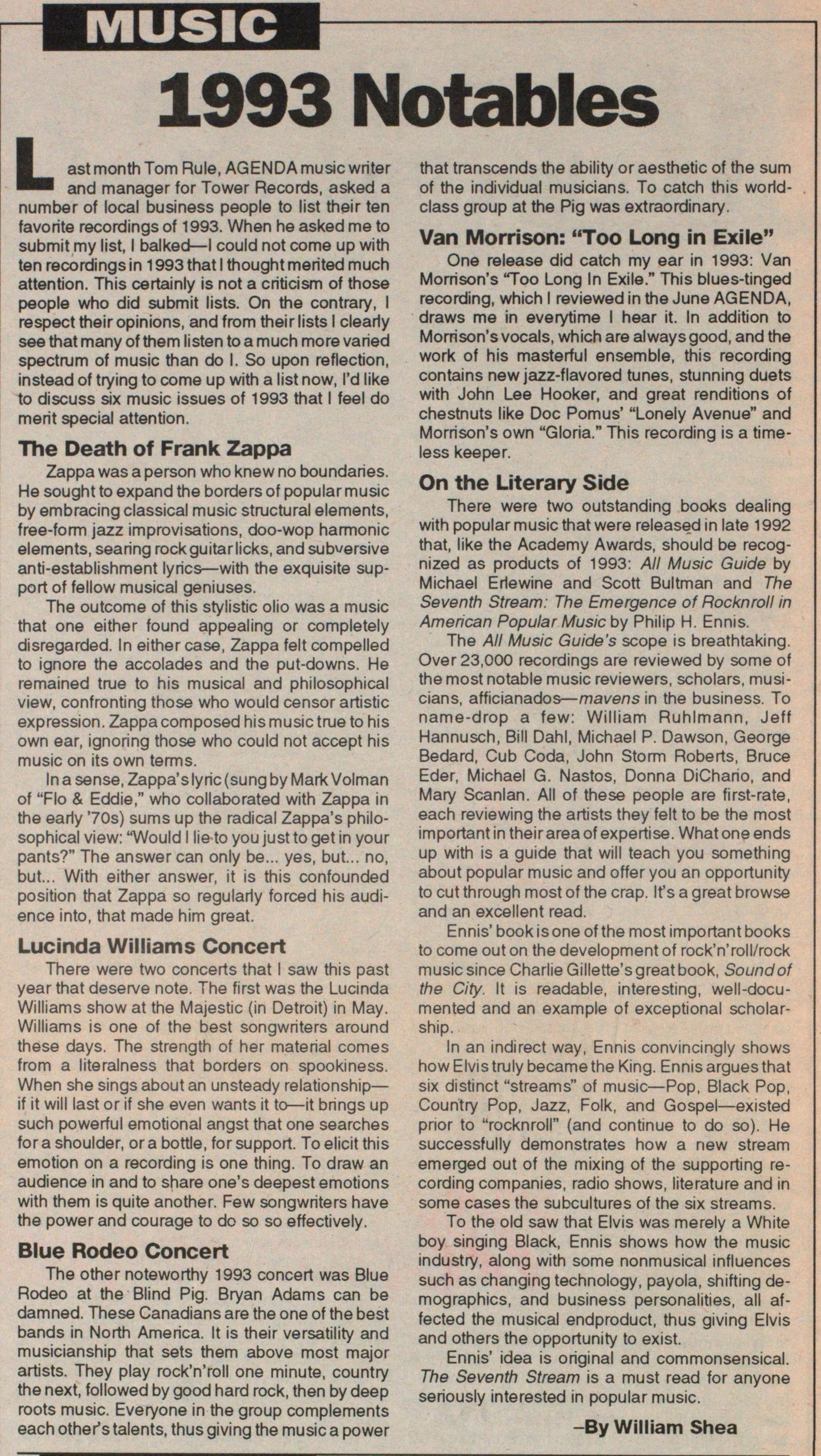Music

MUSIC
1993 Notables
Last month Torn Rule, AGENDA music writer and manager for Tower Records, asked a number of local business people to list their ten favorite recordings of 1993. When he asked me to submit my list, I balked - I could not come up with ten recordings in 1993 that I thought merited much attention. This certainly is not a criticism of those people who did submit lists. On the contrary, I respect their opinions, and from their lists I cleariy see that many of them listen to a much more varied spectrum of music than do I. So upon reflection, instead of trying to come up with a list now, l'd like to discuss six music issues of 1993 that I feel do merit special attention.
The Death of Frank Zappa
Zappa was a person who knew no boundaries. He sought to expand the borders of popular music by embracing classical music structural elements, free-form jazz improvisations, doo-wop harmonie elements, searing rock guitar licks, and subversive anti-establishment lyrics - with the exquisite support of fellow musical geniuses.
The outcome of this stylistic olio was a music that one either found appealing or completely disregarded. In either case, Zappa felt compelled to ignore the accolades and the put-downs. He remained true to his musical and philosophical view, confronting those who would censor artistic expression. Zappa composed his music true to his own ear, ignoring those who could not accept his music on its own terms.
In a sense, Zappa's lyric (sung by Mark Volman of "Flo & Eddie," who collaborated with Zappa in the eariy 70s) sums up the radical Zappa's philosophical view: "Would I lie to you just to get in your pants?" The answer can only be... yes, but... no, but... With either answer, it is this confounded position that Zappa so regulariy forced his audience into, that made him great.
Lucinda Williams Concert
There were two concerts that I saw this past year that deserve note. The first was the Lucinda Williams show at the Majestic (in Detroit) in May. Williams is one of the best songwriters around these days. The strength of her material comes from a literalness that borders on spookiness. When she sings about an unsteady relationship - if it will last or if she even wants it to - it brings up such powerful emotional angst that one searches for a shoulder, or a bottle, for support. To elicit this emotion on a recording is one thing. To draw an audience in and to share one's deepest emotions with them is quite another. Few songwriters have the power and courage to do so so effectively.
Blue Rodeo Concert
The other noteworthy 1993 concert was Blue Rodeo at the Blind Pig. Bryan Adams can be damned. These Canadians are the one of the best bands in North America. It is their versatility and musicianship that sets them above most major artists. They play rock'n'roll one minute, country the next, followed by good hard rock, then by deep roots music. Everyone in the group complements each other's talents, thus giving the music a power that transcends the ability or aesthetic of the sum of the individual musicians. To catch this worldclass group at the Pig was extraordinary.
Van Morrison: "Too Long in Exile"
One release did catch my ear in 1993: Van Morrison's Too Long In Exile." This blues-tinged recording, which I reviewed in the June AGENDA, draws me in everytime I hear it. In addition to Morrison's vocals, which are always good, and the work of his masterful ensemble, this recording contains new jazz-flavored tunes, stunning duets with John Lee Hooker, and great renditions of chestnuts like Doe Pomus' "Lonely Avenue" and Morrison's own "Gloria." This recording is a timeless keeper.
On the Literary Side
There were two outstanding books dealing with popular music that were released in late 1992 that, like the Academy Awards, should be recognized as products of 1993: All Music Guide by Michael Erlewine and Scott Bultman and The Seventh Stream: The Emergence of Rocknroll in American Popular Music by Philip H. Ennis.
The All Music Guide's scope is breathtaking. Over 23,000 recordings are reviewed by some of the most notable music reviewers, scholars, musicians, afficianados - mavens in the business. To name-drop a few: William Ruhlmann, Jeff Hannusch, Bill Dahl, Michael P. Dawson, George Bedard, Cub Coda, John Storm Roberts, Bruce Eder, Michael G. Nastos, Donna DiChano, and Mary Scanlan. All of these people are first-rate, each reviewing the artists they felt to be the most important in their area of expertise. What one ends up with is a guide that will teach you something about popular music and offer you an opportunity to cut through most of the crap. It's a great browse and an excellent read.
Ennis' book is one of the most important books to come out on the development of rock'n'roll rock music since Charlie Gillette's great book, Sound of the City. It is readable, interesting, well-documented and an example of exceptional scholarship.
In an indirect way, Ennis convincingly shows how Elvis truly became the King. Ennis argues that six distinct "streams" of music - Pop, Black Pop, Country Pop, Jazz, Folk, and Gospel - existed prior to "rocknroll" (and continue to do so). He successfully demonstrates how a new stream emerged out of the mixing of the supporting recording companies, radio shows, literature and in some cases the subcultures of the six streams.
To the old saw that Elvis was merely a White boy singing Black, Ennis shows how the music industry, along with some nonmusical influences such as changing technology, payola, shifting demographics, and business personalices, all affected the musical endproduct, thus giving Elvis and others the opportunity to exist. Ennis' idea is original and commonsensical. The Seventh Stream is a must read for anyone seriously interested in popular music.
-By William Shea